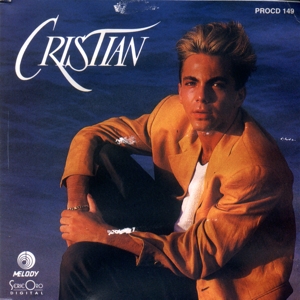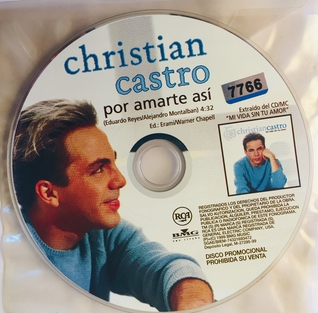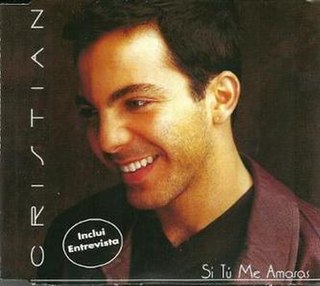
Cristian Sáinz Castro is a Mexican pop singer. He is the son of actors Verónica Castro and Manuel "El Loco" Valdés, and nephew of actors Ramón Valdés and Germán "Tin-Tan" Valdés. Castro has sold over 12 million copies, making him one of the best-selling Latin music artists of all-time.

Humberto "Tito" Nieves is a Puerto Rican musician who became one of the leading salsa singers of the 1980s and the early 1990s.

Melina León is a Puerto Rican merengue singer and actress. From an early age she performed with several groups including The Rubi, Girls of Puerto Rico and The Cherries, with whom she appeared in several San Juan hotels. Her first recording, Mujeres Liberadas, appeared in 1997 on the Tropix Music label. This was followed in 1998 with a Sony release, Con Los Pies Sobre La Tierra. By 2003, she was also performing as an actress on television movies such as: "Yo Creo en Santa Claus" in 2004, broadcast by Televicentro in Puerto Rico, and Wapa America in the United States, among others, and has received several popular awards and had several successful albums and singles on the Billboard Tropical and Latin charts.

Linda Bell Viera Caballero, better known as La India, is a Puerto Rican singer and songwriter of salsa, house music and Latin pop. La India has been nominated for both Grammy and Latin Grammy Awards, winning the Latin Grammy Award for Best Salsa Album for the Intensamente La India Con Canciones De Juan Gabriel album.

Otra Nota is the debut album by American singer Marc Anthony that was released on January 26, 1993, by RMM Records. Produced by Sergio George, it was the first album by Anthony to record in salsa after starting his career as a freestyle musician. Recording of the album began after Anthony asked RMM president Ralph Mercado to record Juan Gabriel's "Hasta Que Te Conocí" in salsa after hearing it on the radio during a taxi ride. Recorded on a low budget, the album peaked at No. 2 on the Billboard Tropical Albums chart and reached No. 30 on the Billboard Top Latin Albums chart.

Todo a Su Tiempo is the second studio album by American recording artist Marc Anthony, released by RMM Records on May 31, 1995. The album was produced by Sergio George, who was also involved with production of Anthony's debut studio album, Otra Nota. The album comprises five new compositions, three of which were written by Omar Alfanno, and four cover versions. Eight singles were released from the album, all but one of which topped the Billboard Tropical Songs chart.

Contra la Corriente is the third studio album released by American singer Marc Anthony on October 21, 1997, by RMM Records. The album was produced by Puerto Rican musician Angel "Cucco" Peña, with most of the songs written by Panamanian composer Omar Alfanno. The album was well received by critics who praised the vocals of Anthony as well as the songs. The album produced six singles, four of which peaked on the top ten on the Hot Latin Tracks chart. Promoted by a sold-out concert in Madison Square Garden, Contra la Corriente became the first salsa album to reach number one on the Top Latin Albums chart and to chart on the Billboard 200.

Desde un Principio: From the Beginning is a greatest hits album from American recording artist Marc Anthony. The album was released on November 9, 1999, by RMM Records & Video (RMM). It was a result of Anthony leaving RMM Records and signing on with Columbia Records. The recording contains fourteen tracks from his years with RMM and "No Me Ames" by Jennifer Lopez and Anthony.

Johnny Rivera is an American salsa singer of Puerto Rican descent.

"Nunca Voy a Olvidarte" is a song written by Roberto Belester and first recorded by Mexican grupero band Bronco for their album Salvaje y Tierno (1991). In the song, the protagonist is leaving and vows to never forget the time he spent with his lover. In 1993, Mexican singer-songwriter Cristian Castro covered the song on his album, Un Segundo en el Tiempo. Castro's version peaked at number-one on the Billboard Hot Latin Songs chart in the United States became his first number-one single.

"Lo Mejor de Mí" is a song written and produced by Rudy Pérez and first recorded by Spanish singer Juan Ramon for his second studio album Por Haberte Amado Tanto (1990). In the song, the protagonist tells his lover how he gave his best despite not meeting his lover's expectation. In 1997, Mexican recording artist Cristian Castro covered the song for his fifth studio album Lo Mejor de Mí which Pérez also produced and arranged. Castro's version peaked at number-one on the Billboard Hot Latin Songs and the Billboard Latin Pop Songs charts in the United States. The song received a Billboard Latin Music Awards and a Lo Nuestro nomination for Pop Song of the Year. Pérez earned the American Society of Composers, Authors and Publishers award in the Pop/Ballad field.

"Por Amarte Así" is a song written by Alejandro Montalbán and Eduardo Reyes and performed by Mexican recording artist Cristian Castro. It was produced by Kike Santander and released in 2000 as the fourth single from his sixth studio album Mi Vida Sin Tu Amor (1999). Lyrically, the song is about a man who promises to keep loving his lover even though she is gone. In the United States, it peaked at number three and two on the Billboard Hot Latin Songs and Latin Pop Songs charts and received a Billboard Latin Music nomination for Pop Track of the Year. "Por Amarte Así" was the fifth best-performing Latin single of 2001 in the United States.

Unica ("unique") is the ninth studio album by Puerto Rican singer La India, released on June 1, 2010 on the Top Stop Music label founded by grammy winner Sergio George. It features the song Estupida, which was released as a single in both ballad and salsa versions, and was her 7th #1 hit on the Tropical Billboard Charts, making her the female with the most #1 hits on the chart. The album's release party was held in San Juan, Puerto Rico.

"Y Hubo Alguien" is a song by American singer Marc Anthony from his third studio album, Contra la Corriente (1997). The song was written by Omar Alfanno, with record production being handled by Ángel "Cucco" Peña. It was released as the first promotional single from the album in 1997. A salsa song which combines elements of R&B, it describes a man who has found love again after his former lover left him. The song was inspired by a fight Alfanno had with his partner and pitched the song to RMM, but was turned down. Anthony offered to record the track after Alfanno presented it to him.
"Hasta Que Te Conocí" is a song by Mexican singer-songwriter Juan Gabriel. It was released in 1986 as the third single from his studio album Pensamientos. Written and produced by Gabriel, the song's lyrics focus on a protagonist learning the meaning of suffering after meeting a lover who mistreats him. It peaked at number two on the Billboard Hot Latin Song chart. A live version of the song was included on his album En el Palacio de Bellas Artes (1990) which peaked at number ten on the Hot Latin Songs chart.

La Negra Tiene Tumbao is the 59th album recorded by Cuban salsa recording artist Celia Cruz. It was released by Sony Music on 2 October 2001. It featured musical collaborations with Mikey Perfecto and Johnny Pacheco and was produced by Sergio George, Isidro Infante, Pacheco, Oscar Gomez, and Angel Carrasco.

"Si Tú Me Amaras" is a Latin ballad written by Rudy Pérez and first performed by Chilean singer Luis Jara in 1996. A year later, Mexican singer-songwriter Cristian Castro covered the song, with Perez's involvement with the production and arrangement. It was released by BMG U.S. Latin on October 20, 1997, as the third single from his fifth studio album, Lo Mejor de Mí (1997).
"Ese Hombre" is a song written by Ana Magdalena and Manuel Alejandro and performed by Spanish recording artist Rocío Jurado for her studio album Señora (1979). It was released by RCA Records as a B-side to "Señora" in 1980. Lyrically, the song is about a womanizer who lures women into a wrongful relationship filled with lies and deceit.
The 6th Lo Nuestro Awards ceremony, presented by the Univision, honored the best Latin music of 1993 and 1994 and took place on May 19, 1994, at a live presentation held at the James L. Knight Center in Miami, Florida. The ceremony was broadcast in the United States and Latin America by Univision.

"Mi Mayor Venganza" is a song by Puerto Rican singer La India from her fifth studio album, Sobre el Fuego (1997). The song was written by Rodolfo Barreras and produced by Isidro Infante, and released as the album's second single in 1997 by RMM Records. It is a salsa song, in which La India tells the woman to keep the man who cheated on the artist out of revenge.


















